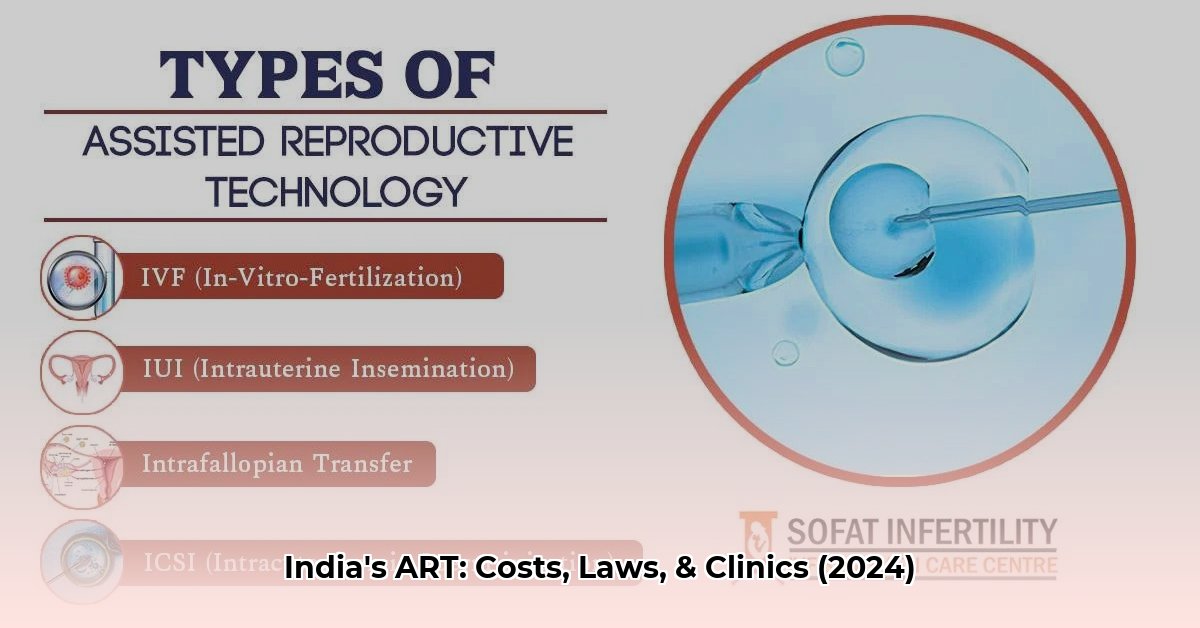Having a baby is a cherished dream for many, but fertility challenges can make this journey complex. Assisted Reproductive Technology (ART) offers hope, and this guide provides comprehensive information about ART in India, including costs, legalities, and finding the right clinic in 2024. Whether you’re exploring IVF, ICSI, IUI, or other options, this guide is your resource for navigating ART and building your family.
Understanding ART in India
What is Assisted Reproductive Technology (ART)?
ART encompasses medical procedures that handle eggs, sperm, and embryos to assist in achieving pregnancy. It’s a scientific approach to addressing infertility, offering various treatment options tailored to individual needs. ART can be seen as a way to support natural conception when it faces obstacles.
Infertility Treatments Available in India
India offers a diverse range of fertility treatments. Here’s a closer look:
-
In Vitro Fertilization (IVF): The most well-known ART procedure, IVF involves fertilizing an egg with sperm in a laboratory setting and transferring the resulting embryo into the uterus.
-
Intrauterine Insemination (IUI): A less complex procedure than IVF, IUI involves placing specially prepared sperm directly into the uterus, increasing the chances of fertilization.
-
Intracytoplasmic Sperm Injection (ICSI): A specialized form of IVF, ICSI involves injecting a single sperm directly into an egg, often recommended for male infertility factors.
-
Surrogacy: In surrogacy, another woman carries the pregnancy for the intended parents. India’s laws prioritize altruistic surrogacy, where the surrogate receives no financial compensation beyond reasonable expenses.
-
Gamete Donation (Egg and Sperm): Donor gametes (eggs or sperm) can be used in conjunction with IVF or IUI when using one’s own gametes is not possible.
-
Other Treatments: Additional procedures and medications, such as hysteroscopy and hormone therapies, can address specific fertility issues.
The ART Act of 2021: Ensuring Safe and Ethical Practices
The ART Act of 2021 is a landmark legislation regulating ART practices in India, prioritizing ethical considerations and patient safety. It establishes guidelines for gamete donation, surrogacy arrangements, and pre-implantation genetic testing, creating a more secure environment for those seeking fertility treatment. This Act is a crucial component of the legal framework surrounding ART in India. It aims to ensure ethical practices, protect the rights of all parties involved, and promote standardized care across fertility clinics.
Choosing an ART Clinic in India
Finding the Right Fertility Clinic
Selecting the right clinic is a critical step in your ART journey. Consider these factors:
-
Accreditation and Registration: Look for NARI (National ART Registry of India) accredited clinics, indicating adherence to quality and ethical standards.
-
Success Rates: While not a guarantee of individual outcomes, success rates offer insights into a clinic’s performance with various ART procedures. Inquire about procedure-specific success rates and discuss what they might mean for you with your fertility specialist.
-
Transparent Pricing: Fertility treatments are a financial investment. Request a detailed cost breakdown for all procedures, medications, and additional services upfront.
-
Technology and Expertise: Choose clinics that invest in state-of-the-art technology and have a team of experienced fertility specialists capable of creating a personalized plan. The role of cutting-edge technology in achieving higher success rates is subject to ongoing research.
-
Emotional Support: Fertility treatment can be emotionally taxing. A clinic offering comprehensive counseling services can significantly impact your overall experience. Some experts suggest that integrating emotional support into the treatment plan is essential.
Costs of ART in India
Understanding the Financial Aspects
ART costs in India are generally lower than in many Western countries, but they vary depending on the treatment, clinic location, and individual needs.
| Procedure | Estimated Cost Range (INR) |
|---|---|
| IUI | 5,000 – 15,000 |
| IVF | 1,00,000 – 3,00,000 |
| ICSI | 1,25,000 – 3,50,000 |
| Surrogacy | 15,00,000 – 25,00,000 |
| Egg Donation | 50,000 – 1,00,000 |
| Sperm Donation | 10,000 – 25,000 |
Note: These figures are estimates. Always consult with clinics for accurate and personalized cost assessments.
Factors influencing cost variations include clinic location (metropolitan areas tend to be more expensive), doctor’s experience and reputation, technology used, the number of IVF cycles required, and the use of donor gametes. Explore budget-friendly options like government-supported clinics, NGO/trust-run centers, or minimal stimulation IVF. Consider medical loans, EMIs, or clinic-specific financing plans to manage expenses.
Legal Aspects of ART in India
Navigating the Legal Framework
The ART Act of 2021 and the Surrogacy (Regulation) Act of 2021 govern ART in India. Key aspects include:
- National Registry: The ART Act establishes a national registry of ART clinics and banks, promoting standardization and quality control.
- Gamete Donation: Clear guidelines regulate who can donate gametes and under what conditions.
- Surrogacy: Commercial surrogacy is prohibited. Altruistic surrogacy is permitted under specific criteria.
- Parental Rights: The Act protects the rights of children born through ART, granting them equal inheritance rights.
- Eligibility: Current regulations primarily cater to heterosexual married couples and single widowed or divorced women. This has raised concerns about inclusivity.
Navigating the legal landscape requires understanding parental rights, donor anonymity regulations, and surrogacy agreements. Consulting a legal professional specializing in reproductive laws in India is highly recommended.
Types of ART Procedures: A Detailed Look
In-Vitro Fertilization (IVF)
IVF involves retrieving eggs from the ovaries, fertilizing them with sperm in a lab, and transferring the resulting embryos into the uterus. It addresses various fertility challenges, including blocked fallopian tubes and male infertility factors.
Intrauterine Insemination (IUI)
IUI is a less invasive and more affordable procedure where specially prepared sperm is placed directly into the uterus during ovulation. IUI is often considered for milder infertility cases, unexplained infertility, or when using donor sperm.
Surrogacy
Surrogacy involves a woman (the surrogate) carrying a pregnancy for the intended parent(s). This option is available for individuals with uterine issues, medical conditions making pregnancy risky, or same-sex male couples. India’s laws prioritize altruistic surrogacy.
Emotional Support and Resources
Your Emotional Well-being
Fertility treatments can be emotionally challenging. Seek support from counselors, support groups, or therapists specializing in fertility issues. Open communication with your partner, family, and friends can also be invaluable. Remember, you’re not alone.
This comprehensive guide aims to provide a clear and informative resource for those exploring ART in India. While this information is for educational purposes, it is essential to consult with qualified fertility specialists for personalized guidance and treatment recommendations. Remember, the journey to parenthood may be complex, but advancements in ART offer hope and possibilities.
- How To Generate Power At Home For Energy Independence - February 4, 2026
- How Can I Produce Electricity At Home Using Renewable Sources? - February 3, 2026
- How To Generate Electricity at Home Using Renewable Energy - February 2, 2026
















